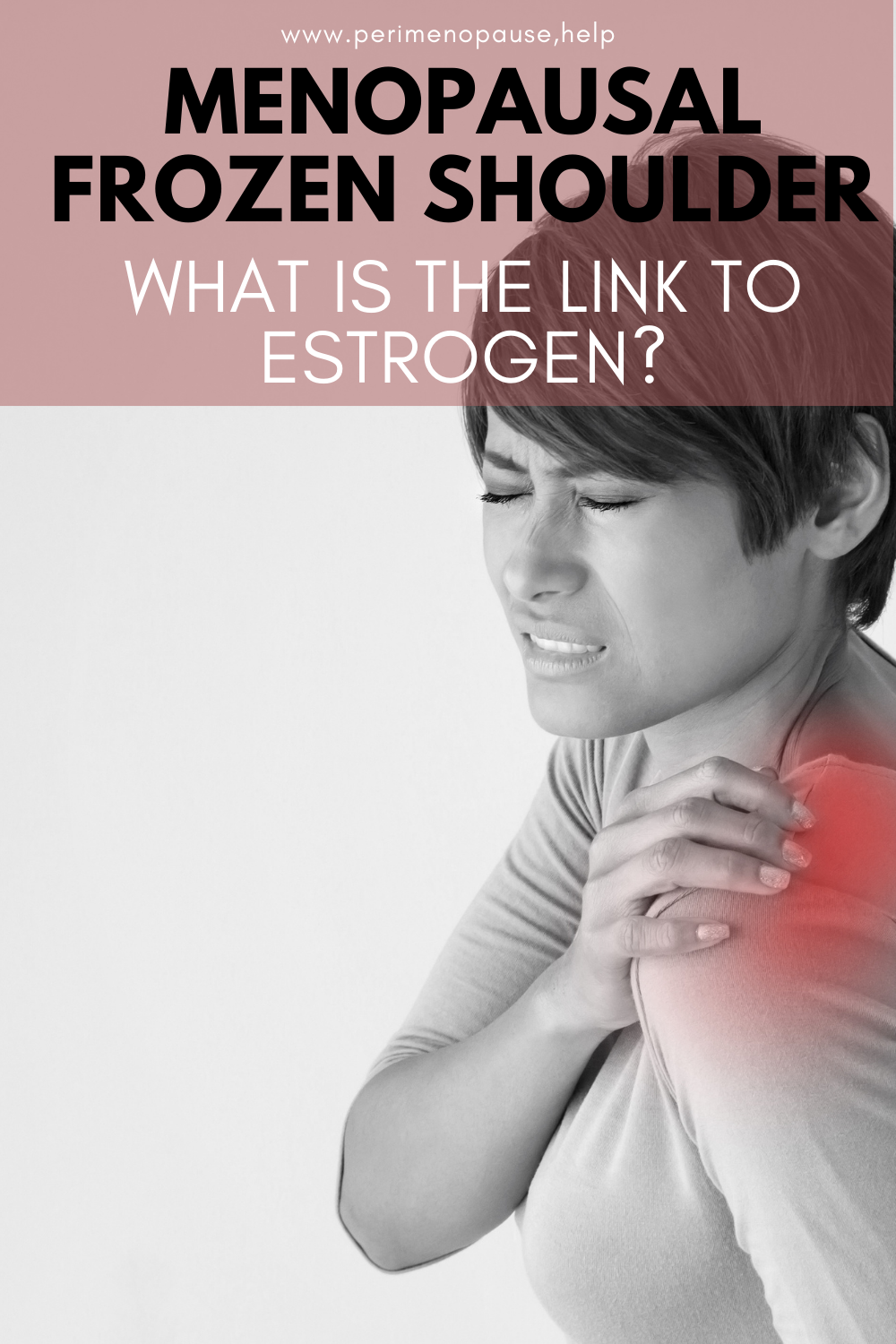Are you experiencing persistent shoulder pain and stiffness that seems to be getting worse during menopause? You’re not alone. Many women find themselves dealing with menopausal frozen shoulder (and it can even start during perimenopause), and there’s a fascinating connection to hormonal changes that deserves attention.
The relationship between menopause and frozen shoulder isn’t just coincidence – it’s rooted in biology. Let’s explore why this painful condition affects so many women during the menopause, and even in perimenopause, and what you can do about it.
Key Takeaways
- Frozen shoulder, or adhesive capsulitis, primarily affects women aged 40 to 60, with an average onset age of 55.
- Estrogen plays a vital role in maintaining shoulder tissue integrity and reducing inflammation.
- Women not on hormone replacement therapy (HRT) and with imbalanced estrogen levels have a significantly higher risk of developing frozen shoulder.
- Treatment options for frozen shoulder include physical therapy, medications, lifestyle changes, targeted supplements, and, in some cases, surgical interventions.
- The recovery from frozen shoulder can take 1 to 3.5 years, emphasizing the importance of early diagnosis and management, and working with a provider to develop and adjust strategies as needed.
This post may contain affiliate links for which I earn a small commission, at no additional cost to you.
Understanding Menopausal Frozen Shoulder
Definition and Symptoms
Frozen shoulder, medically known as adhesive capsulitis, is a painful shoulder condition characterized by stiffness, pain, and significantly limited range of motion in the shoulder joint. The condition develops gradually, often starting with a dull, aching pain that worsens with movement.
Common symptoms include: – Persistent pain, especially at night – Difficulty with everyday movements like reaching, dressing, or combing hair – Progressive stiffness in the shoulder joint capsule – Pain radiating down the arm – Reduced ability to move the shoulder in all directions
The pain can be severe enough to interfere with sleep and daily life, making even simple tasks challenging.
Phases of Frozen Shoulder
Frozen shoulder typically progresses through three distinct phases, with the entire cycle lasting anywhere from 1 to 3.5 years, with an average recovery time of 2.5 years according to many orthopedic and physical therapy experts.
- Freezing Phase: Lasting 2-9 months, characterized by increasing pain and stiffness. During this phase, the shoulder capsule begins to thicken and contract.
- Frozen Phase: Lasting 4-12 months, where pain may actually decrease, but stiffness worsens. Range of motion becomes severely limited during this phase.
- Thawing Phase: Lasting 5-24 months, with gradual improvement in mobility and decreasing pain. The shoulder slowly returns to normal or near-normal function.
Understanding which phase you’re in can help determine appropriate treatment approaches, and reflecting on which phase responds to what interventions.
The Link Between Menopause and Frozen Shoulder
Hormonal Changes During Menopause
During menopause, women experience significant hormonal shifts that affect multiple body systems. The most notable change is the dramatic decrease in estrogen production, particularly during phase 2 of perimenopause and into menopause. To learn more about the phases of perimenopause and menopause check out this blog.
This loss of estrogen doesn’t just cause hot flashes and mood swings – it profoundly impacts the musculoskeletal system. As estrogen levels decline, women often notice increased joint pain, stiffness, and vulnerability to certain inflammatory conditions. I have often seen this manifest as joint pain, muscle pain, and yes, quite often, frozen shoulder. Arthritis conditions can also worsen.
The menopause transition represents a time of increased vulnerability for women’s joint health. These hormone changes can trigger what some call the “musculoskeletal syndrome of menopause.”
Role of Estrogen in Shoulder Health
Why does estrogen matter so much for your shoulders? Research has revealed that estrogen plays a crucial role in maintaining connective tissue integrity and joint function.
According to Dr. Jocelyn Wittstein from Duke University School of Medicine, “Estrogen plays a role in stimulating bone growth, reducing inflammation, and promoting connective tissue integrity.” Her research has established a direct link between estrogen levels and frozen shoulder risk (read more about her research in the link above).
Estrogen receptors are present throughout the shoulder joint capsule and surrounding tissues. When estrogen levels drop during menopause, these tissues become more vulnerable to inflammation and injury.
This hormonal change can lead to: – Increased inflammation in the joint – Thickening of the shoulder capsule – Formation of scar tissue – Reduced elasticity in connective tissues – Compromised healing processes
Risk Factors for Developing Frozen Shoulder
Age and Gender Considerations
Frozen shoulder isn’t exclusively a menopausal condition, but there’s a clear pattern in who it affects most. The condition predominantly impacts women aged 40 to 60, with an average onset age of 55 – precisely when most women experience the initial stages and into the final stage of menopause. To review, menopause is technically just the day you have gone a year without a period, while perimenopause are the years leading up to this.
This timing isn’t coincidental. The term “50-year-old shoulder” is sometimes used informally to describe this condition because of its prevalence in this age group.
Additional risk factors that increase your chances of developing frozen shoulder include: – Diabetes (people with diabetes have a significantly higher risk) – Thyroid disorders – Previous shoulder injuries or surgeries – Prolonged immobility of the shoulder – Certain autoimmune conditions – Family history of frozen shoulder
Women face a greater chance of developing this condition, with some studies suggesting they’re up to twice as likely as men to experience frozen shoulder.
Impact of Hormone Replacement Therapy (HRT)
Emerging research suggests that hormone replacement therapy may play a protective role against frozen shoulder. A fascinating study presented at the North American Menopause Society meeting revealed some compelling findings.
According to this research, women not receiving HRT had a 99% higher risk of adhesive capsulitis compared to those who did. Approximately 4% of menopausal women on HRT experienced adhesive capsulitis, compared to 7.7% of those not on HRT.
This retrospective cohort study provides preliminary evidence that maintaining estrogen levels through HRT might help preserve joint health and reduce the risk of developing frozen shoulder during menopause.
However, it’s important to note that HRT is not officially indicated specifically for treating frozen shoulder, and decisions about hormone therapy should always involve careful consideration of all potential benefits and risks with your healthcare provider.
In my functional medicine practice, I use Bioidentical Hormone Replacement Therapy, and I avoid prescribing synthetic progesterone of any kind.
Treatment Options for Frozen Shoulder
Physical Therapy and Rehabilitation
Physical therapy remains the cornerstone of treatment for frozen shoulder. Working with a skilled physical therapist (PT) can help maintain and gradually increase your range of motion while managing pain.
Effective physical therapy approaches may include: – Gentle stretching exercises – Range-of-motion activities – Strengthening of surrounding muscles – Manual therapy techniques – Dry Needling -Heat therapy and cold therapy applications – Education on modifying daily activities and home exercises to build strength and range of motion
Consistency is key – most patients need regular sessions over several months. Your therapist will likely provide home exercises that should be performed daily for optimal results and it is essential that you do these exercises at home daily.
For pain relief between therapy sessions, you might try: – Cold packs for acute pain and inflammation – Heat for relaxing tight muscles – Over-the-counter pain medications (with medical guidance), but see below for some natural options – Gentle movement within your comfort zone -Using resistance bands to increase range of motion as part of a routine from your PT (here’s a good video to reference)
Natural Support for Frozen Shoulder
Frozen shoulder treatment strategies aren’t limited to just medications or PT appointments.
While physical therapy and movement are cornerstones of recovery, natural supplements may offer additional support for reducing pain, improving flexibility, and calming inflammation.
Supplements to help joint mobility and decrease inflammation
-
Magnesium – Helps relax tight muscles, supports nerve health, and may reduce stiffness that worsens frozen shoulder. For more on my favorite types of magnesium check out this blog.
-
Omega-3 fatty acids (fish oil) – Known for their anti-inflammatory benefits, omega-3s may ease pain and support joint healing. I love omega 3, either fish oil based or algae based depending on your preference. Here are two of my favorites:
- High-potency fish oil supplement providing 720 mg of combined EPA and DHA omega-3 fatty acids per serving to support cardiovascular, musculoskeletal, and immune system health*
- Purity tested and sustainably sourced from cold-water fish; rigorously screened for heavy metals, pesticides, and other contaminants to ensure superior quality and freshness*
- Antioxidant-stabilized and flavored with natural lemon-lime for freshness—no fishy aftertaste; formulated for optimal absorption and easy daily use*
- Manufactured in a cGMP-certified facility and Certified B Corporation; backed by science and trusted by healthcare practitioners for over 40 years*
- As the #1 Doctor Recommended Professional Supplement Brand, Metagenics delivers clinically proven, precision-crafted formulas to support your health at its core—because true wellness starts with integrity, balance, and expertise
- THE NUMBER ONE VEGETARIAN OMEGA-3 IN THE U.S. - Research shows that the essential fatty acids EPA & DHA in algae oil support heart, eye, immune & brain health.
- WHY ALGAE OMEGA - Nordic Naturals Algae Omega can help vegetarians & vegans meet their daily recommended serving of omega-3 EPA + DHA.
- PLANT-BASED OMEGA-3 - Derived from microalgae, our Algae Omega is certified vegan by the American Vegetarian Association and provides a sustainable, fish-free alternative to fish oil supplements.
- PURITY GUARANTEED - At Nordic Naturals, everything we make is non-GMO & third-party tested, surpassing the strictest international standards for purity & freshness. Algae Omega is gluten & dairy free, with no artificial colors or preservatives.
- ETHICAL INNOVATION - Nordic Naturals is proud to be at the forefront of sustainable & ethical practices in the natural products industry. Through science & innovation, we are committed to delivering safe, effective nutrients to support foundational wellness.
-
Turmeric/Curcumin – A natural anti-inflammatory that can calm irritation in the shoulder joint and surrounding tissues. Turmeric can also be helpful with arthritis pain and gut inflammation.
Gaia Herbs Turmeric Supreme Extra Strength - Supports Occasional Discomfort from Normal Wear & Tear* - with Turmeric Curcumin & Black Pepper - 60 Vegan Liquid Phyto-Caps (Up to 60 Servings)- Turmeric Curcumin Extract: Turmeric Supreme Extra Strength provides active lifestyle support and supports healthy mobility in healthy individuals*
- Bioavailable Curcumin: These turmeric capsules are formulated with black pepper extract to aid absorption*
- Turmeric Herbal Supplement: Contains a blend of three different turmeric root extracts in each gluten-free, dairy-free, and soy-free capsule*
- Our Commitment to Quality: We thoughtfully source high-quality ingredients from around the world, guided by integrity and a deep respect for people, plants, and the planet
- About Gaia Herbs: For over 35 years, Gaia Herbs has helped people live healthier, more balanced lives by formulating products based on traditional herbal approaches while seeking support from modern science. We carefully oversee every step from soil to supplement to ensure purity, quality, and integrity you can trust.
-
Collagen peptides – Provide building blocks for connective tissue repair, which can be especially helpful when ligaments and tendons are involved. Collagen has been a game changer for many of my female patients dealing with menopausal frozen shoulder! But don’t expect overnight improvement, for any of these supplements, they work behind the scenes to help decrease inflammation and should be paired with physical therapy, gentle exercise, and other interventions if needed.
Vital Proteins Marine Collagen Peptides Powder Supplement for Skin Hair Nail Joint - Hydrolyzed Collagen - 12g per Serving - 7.8 oz Canister- Bioavailable Collagen Peptides Powder ---- Our Marine Collagen is made from the scales of fresh, non-GMO, wild-caught white fish off the coast of Alaska. It’s highly bioavailable, digestible and soluble in cold water.
- Health Beneficial ---- Marine collagen peptides can be digested and absorbed by the body quickly for maximum benefits. Helps improve the health of your hair, skin, nails, joints and ligaments, and tendons**.
- Easy to Use ---- Soluble in hot or cold liquids, including coffee, smoothies, and tea. 1-2 scoops a day is all you need! It can be taken in the morning, afternoon or in the evening.
- Dietary Compliant ---- Paleo Friendly & Whole30 Approved. No added sugars or sweeteners. Made without gluten / cholesterol / mercury / dairy. Flavorless.
Taken together, these nutrients can help support the body’s ability to heal while improving overall joint comfort. Because frozen shoulder can last many months, combining targeted supplements with gentle mobility work, physical therapy and/ or acupuncture, and stress reduction practices helps provide a more complete healing strategy.
Medications and Surgical Interventions
When conservative approaches aren’t providing adequate relief, medical interventions may be necessary. Your health care provider might recommend:
- Non-steroidal anti-inflammatory drugs (NSAIDs) or Acetaminophen for pain relief. I often start with Arnica cream and/or homeopathic arnica tablets as they are better tolerated than otc pain meds and often very effective.
- Corticosteroid injections can provide significant temporary relief, especially in early stages
- Hyaluronic acid injections may help in some cases
- Hydrodilatation (distension arthrography) – injecting fluid to stretch the joint capsule
- Manipulation under anesthesia
- Arthroscopic surgery to release the tight capsule (typically considered a last resort)
It’s worth noting that while these interventions can help manage symptoms, they don’t necessarily address the underlying hormonal factors that may be contributing to the condition.
Conclusion
Frozen shoulder represents one of the most common problems facing women during menopause, with a clear connection to declining estrogen levels. Understanding this link can help women and their healthcare providers take a more comprehensive approach to prevention and treatment.
While frozen shoulder can be extremely painful and limiting, the good news is that with appropriate care and patience, most women will eventually experience significant improvement. The condition typically resolves within a anywhere from months to a couple of years, though early intervention can help reduce both the severity and duration of symptoms.
If you’re experiencing shoulder pain during menopause, don’t dismiss it as just another inevitable sign of aging. Speak with your shoulder specialist or primary care provider about the potential connection to hormonal changes and explore treatment options that address both the mechanical and hormonal aspects of your condition.
Remember that while frozen shoulder is common, it doesn’t have to significantly impact your quality of life with proper care and management. And if the initial plan isn’t working be sure to work with your provider to adjust your strategy!
This post was all about menopausal frozen shoulder
Sign up for our newsletter to receive more information about menopause and joint health, including the latest research on hormonal influences on the musculoskeletal system.
Found this article helpful? Please share this article on social media to help other women understand the connection between menopause and frozen shoulder.

Dr. Shelley Meyer is a board-certified family physician and Institute of Functional Medicine-certified functional medicine physician, as well as a Registered Dietitian. She is passionate about helping women navigate the roller coaster of perimenopause and postmenopause. She has her own Functional Medicine Practice in Denver, Colorado.










Leave a Reply
You must be logged in to post a comment.